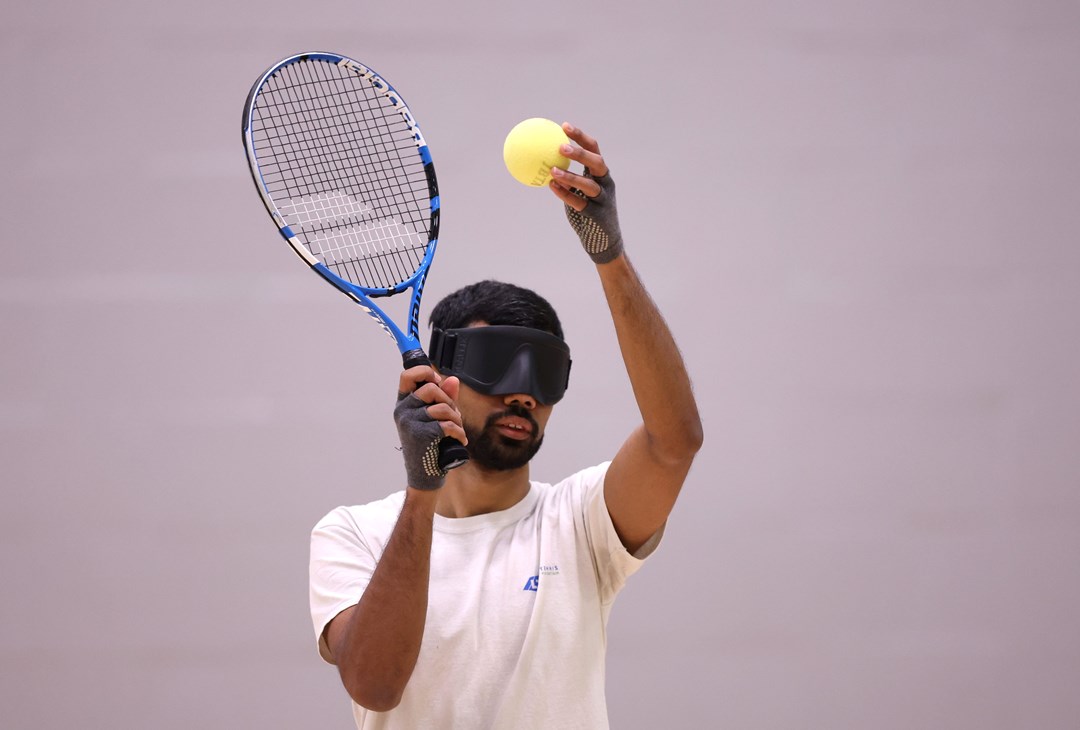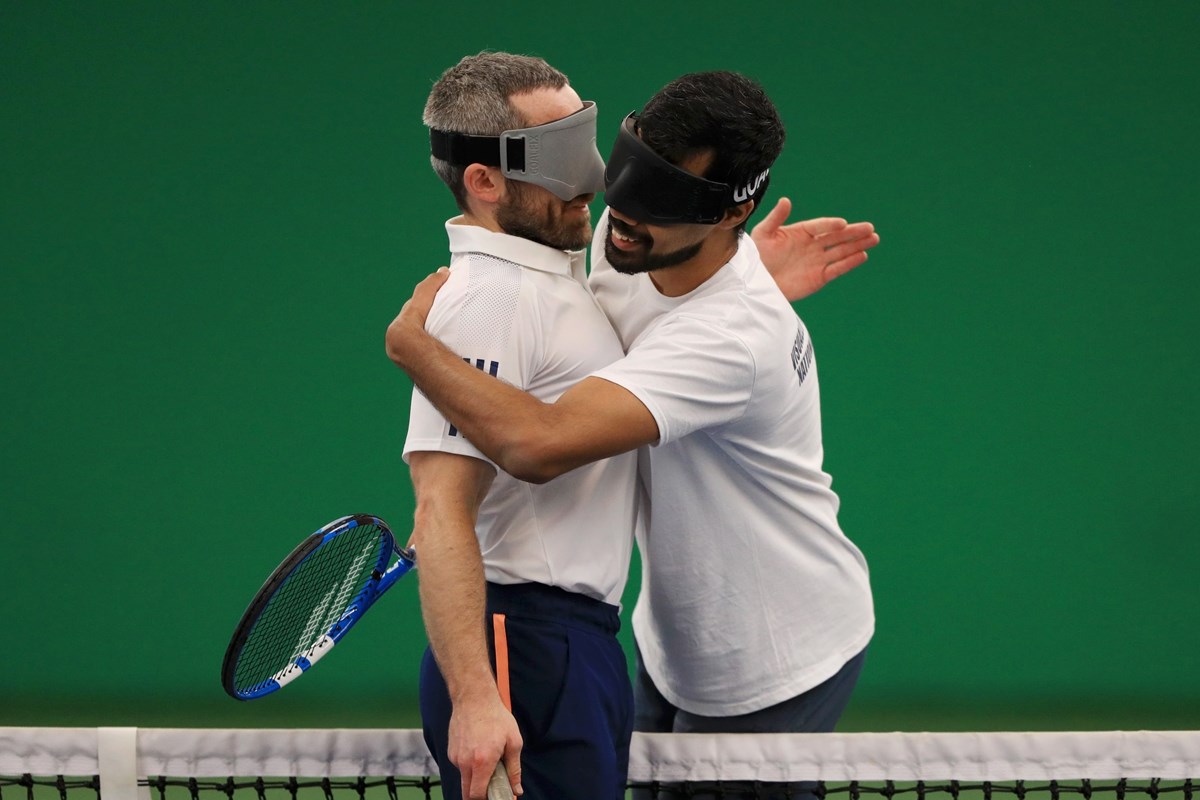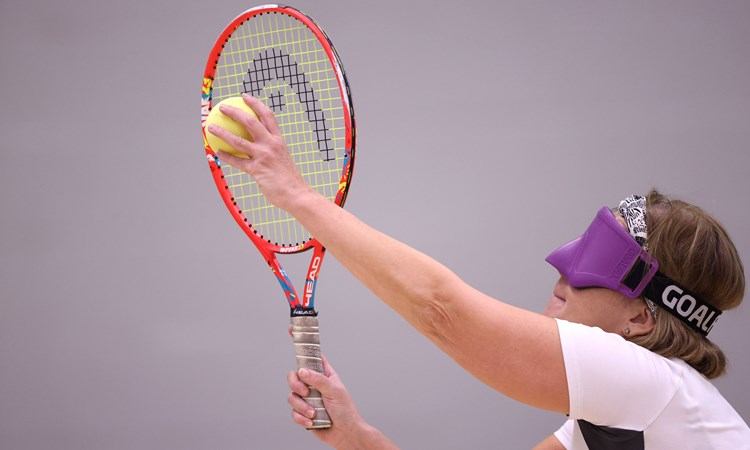
“The lack of sight didn’t translate to a lack of vision”: VI tennis player Naqi Rizvi shows disability is not inability
• 4 minute read
From rocking up to his first visually impaired (VI) tennis session in jeans and formal footwear to promptly ascending the IBTA world rankings after being crowned World Champion of the B1 men’s category, Naqi Rizvi has unquestionably altered the entire VI tennis landscape with his indisputable talent.
Despite having already won all the game has to offer, including World and European Championships, 33-year-old Naqi didn’t become acquainted with VI tennis until his move to London nearly a decade ago.
Born and raised in South Asia to a Pakistani father and Indian mother, Naqi grew up with limited sight due to an incurable eye disease called Congenital Glaucoma, which gradually deteriorated due to the progressive damage of the optic nerve. He had suffered complete vision loss by the age of seven.
Due to severe pressure that would often cause constant watering of the eyes, pain and aversion to light (photophobia), Naqi made the decision to undergo a surgery called Enucleation in 2014, replacing his eyes with prosthetics to improve his quality of life.
...making people understand that disability is not the same as inability.
As someone who always possessed a certain optimism and love for life, and thanks to the support system in his family, Naqi continued to dream big following his surgery.
“I had a difficult but very loving upbringing which has largely shaped my view of the world,” said Naqi. “We grew up very financially constrained and my disability only made things more complicated.
“I don’t have many visual memories due to losing my sight early in life, and I find it difficult to relate to simple visual concepts such as ‘beauty’, or how people pick up social cues through body language. Daily challenges are also amplified including walking around with a cane, accessing technology, partaking in some social activities and making people understand that disability is not the same as inability.
“The lack of sight didn’t translate to a lack of vison and my family always stood by me as I fought to pursue undergraduate and master’s degrees in engineering, before working for an engineering firm and then in financial services.”

Not only did Naqi’s determination, dedication and drive lead him to a successful and rewarding professional career, but his perseverance and passion for sport would also catapult him to the sporting summit of VI tennis in domestic and international competition.
“When I first came to London in 2015, and after discovering Metro Blind Sports, I wanted to try all VI sports as I didn’t have much access to any adapted sport growing up other than blind cricket,” said Naqi.
“As soon as I stepped on a tennis court, I fell in love. Even though I had too much enthusiasm and no control over my own shots, I felt that I had potential and wanted to keep going… I had never seen or played tennis before, so I started from scratch and slowly learned the technical side of the game, the mental aspect and all the rules.
“While I do enjoy other sports too, tennis is special as it allows me a sense of freedom while other sports don’t. For example, I run with a guide and need to follow their instructions in terms of obstacles and turns. But on court, I am free to run around without a cane or guide and that feeling of freedom is unreal. I also enjoy the adaptability of the sport and thinking on your feet.”
Since the start of his tennis career eight years ago, Naqi’s name has become known worldwide. In 2021, the then 29-year-old won the B1 men’s singles category at the Visually Impaired Tennis National Finals for the first time and has maintained his unbeaten record to this day.
Thereafter, the three-time National Champion extended his dominance globally, winning bronze representing Pakistan at the 2019 World Championships before striking gold at the 2023 IBSA World Games.
“I have a lot of beautiful memories on court but also a lot of heartache which is the package you sign for as an athlete,” Naqi explained. “Some of my fondest memories include standing on the podium as the winner at the World Games and having my national anthem played in front of the entire crowd; training with a sighted volunteer and having a 30-shot rally, which I believe I won; winning the UK Nationals for the first time in 2021 and the World Championships in 2023 after fairly difficult matches.”

Speaking on his journey to the top of the IBTA world rankings, Naqi added: “I was very humbled and incredibly ecstatic to become world No.1, especially as I almost lost the semi-final at the World Championships last year.
“I had the honour of playing two of my biggest opponents and to come out on top felt amazing. It was always a dream for me and to achieve it made me realise that all those hours I had put in on and off the court had paid off. My family couldn’t be there to see me win and I felt a huge sense of joy knowing that they were proud of me.”
...on court, I am free to run around without a cane or guide and that feeling of freedom is unreal.
For Naqi, being able to experience these emotional highs and lows that VI tennis brings is part of what makes the sport so special, not only for him, but his opponents on the other side of the net as well.
“I am able to channel my competitiveness and yearning for freedom positively on a tennis court. Playing sports makes me more resilient as I face a lot of challenges, and I know that winning and losing are part of life but what’s more important is how you are as a human being. I really focus on making the court a positive environment for my opponents and all those involved, and I hope I’ll be remembered as a kind and fun tennis player who tried his best to ensure that a match is about camaraderie, not just being the best.
“I know that VI tennis positively impacts many people and gives them a sense of purpose, achievement, socialisation and being part of a brilliant community.”
The LTA is proud to support visually impaired tennis through the Open Court programme, which promotes and delivers opportunities for disabled people to get involved in tennis and padel. The LTA’s VI tennis performance programme gives players like Naqi the chance to represent Great Britain on the international stage.
How to get involved
Whether you want to play, compete or just learn more, find out more about VI tennis here:





